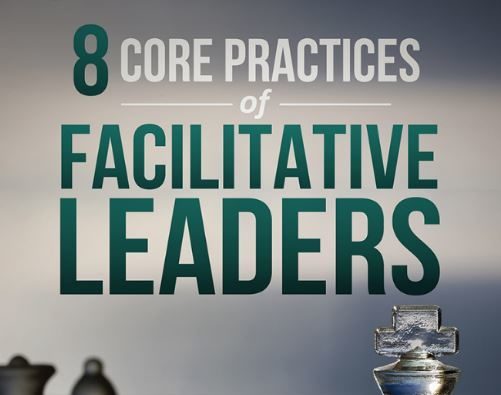- Click on a Subject area to see the topics in that area
- Click on a Topic to see details about that topic.
- Click on Book Michael to get a price quote or additional information
Have a specific duration in mind? Nearly all topics can be customized to fit your time goals.
Overview
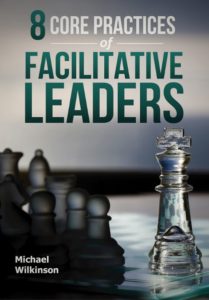 Many leaders in the past have viewed their role as setting direction, allocating resources, and driving personnel to achieve the direction. Yet a major shift has been occurring in the workplace. Leaders are recognizing the need to inspire employees rather than command and control them. Employees are seeking to participate in decision-making and not just be impacted by it. No longer willing to be just pairs of hands and feet, employees are looking to understand where their organizations are going and to influence the paths taken to get there.
This shift in the workplace is requiring a new set of leadership skills. Leaders must be able to facilitate rather than dictate. They must understand how to inspire people, develop trust, manage group interaction, resolve conflict, and build consensus.
Many leaders in the past have viewed their role as setting direction, allocating resources, and driving personnel to achieve the direction. Yet a major shift has been occurring in the workplace. Leaders are recognizing the need to inspire employees rather than command and control them. Employees are seeking to participate in decision-making and not just be impacted by it. No longer willing to be just pairs of hands and feet, employees are looking to understand where their organizations are going and to influence the paths taken to get there.
This shift in the workplace is requiring a new set of leadership skills. Leaders must be able to facilitate rather than dictate. They must understand how to inspire people, develop trust, manage group interaction, resolve conflict, and build consensus.
Description
In this session, Michael Wilkinson, the highly dynamic author of The Eight Core Practices of a Facilitative Leader, provides leaders with tools and techniques for taking a facilitative approach to leadership based on the SUCCEEDS model. Participants will want to fasten their seatbelts for this fast-paced, highly engaging and interactive workshop.The SUCCEEDS Model for Facilitative Leadership
- Start with the why; engage with the how
- Understand and empower; don’t command and control
- Communicate in their language, not yours
- Connect first; correct second
- Equip for success, monitor for results
- Engage conflict; encourage disagreement
- Drive strategic thinking throughout the organization
- Start, execute, and close every meeting masterfully
Durations
- Keynote
- Half-day
- Full day
- Multi-day
Overview
 What’s the difference between a manager and a leader? Some people use the terms interchangeably, as if they essentially mean the same thing. Others have a sense that there is a difference, but have trouble articulating what the difference is. Likewise, some people believe leaders are born, or that you have to be promoted into leadership.
In this highly interactive workshop based on The 8 Core Practices of a Facilitative Leader, participants will:
What’s the difference between a manager and a leader? Some people use the terms interchangeably, as if they essentially mean the same thing. Others have a sense that there is a difference, but have trouble articulating what the difference is. Likewise, some people believe leaders are born, or that you have to be promoted into leadership.
In this highly interactive workshop based on The 8 Core Practices of a Facilitative Leader, participants will:
- Learn the key differences between a manager and a leader
- Understand the 3 Levels of Leadership
- Identify at what level they are currently operating and what they can do to move to a higher level.
| Level 3 VISIONARY "Forward Focus" |
|
| Level 2 COACH "People Focus" |
|
| Level 1 OVERSEER "Task Focus" |
|
Agenda
- The Difference between a Manager and a Leader
- The 3 Levels of Leadership
- Your Leadership Level
- Your Next Steps for Moving to a Higher Level
Durations
- Keynote
- Half-day
Overview
 As a leader of a team or a department, what do you do when a member of your staff accuses you of not trusting him or her? And what if the staff member is correct? What if you really don’t trust the staff member? Or what if a client, a supplier, or a peer doesn’t trust you? How do you address it?
While many think of trust as something soft and amorphous, in our course, The Facilitative Leader, we show leaders that trust can be broken down into 5 key components which we call the Five Cs of Trust. When you don’t trust someone, or someone doesn’t trust you, it is typically because of one or more of the Five Cs.
As a leader of a team or a department, what do you do when a member of your staff accuses you of not trusting him or her? And what if the staff member is correct? What if you really don’t trust the staff member? Or what if a client, a supplier, or a peer doesn’t trust you? How do you address it?
While many think of trust as something soft and amorphous, in our course, The Facilitative Leader, we show leaders that trust can be broken down into 5 key components which we call the Five Cs of Trust. When you don’t trust someone, or someone doesn’t trust you, it is typically because of one or more of the Five Cs.
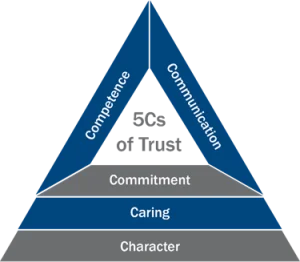 When someone says, "I trust you," it means “I believe...”
When someone says, "I trust you," it means “I believe...”
- Competence ...You have the necessary skills and expertise
- Communication ...We truly hear and understand each other
- Commitment ...You are committed to our success
- Caring ...You have my interest at heart
- Character ...You are honest and ethical
Agenda
In this workshop, participants will learn the 5 Cs of Trust and steps to take to identify the C and to resolve it in order to build stronger, trusting relationships throughout the enterprise.- Why Do You Trust Someone?
- The 5 Cs of Trust
- Holding a Trust Conversation
- Your Next Steps for Addressing Trust Issues
Durations
- Keynote
- Half-day
Overview
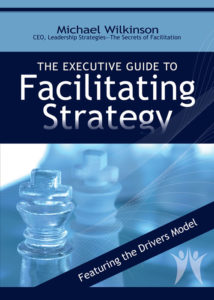 When leaders have a strategic vision, they can influence the organization to make decisions along the way that bring that vision into reality. However, strategic thinking skills should not be limited to the top people in an organization. Facilitative leaders understand the importance of spreading strategic thinking to all levels. They recognize that the more people who are thinking strategically, the more that will be making decisions that have positive, long-term, sustainable impact on the organization.
When leaders have a strategic vision, they can influence the organization to make decisions along the way that bring that vision into reality. However, strategic thinking skills should not be limited to the top people in an organization. Facilitative leaders understand the importance of spreading strategic thinking to all levels. They recognize that the more people who are thinking strategically, the more that will be making decisions that have positive, long-term, sustainable impact on the organization.
Description
This workshop introduces The Drivers Model, a robust yet simple method for strategic thinking. The Drivers Model is fully scalable and can apply to Fortune 500 companies, non-profit organizations, government agencies, entire enterprises, single business units, field offices, individual departments, and a work team.Agenda
- What is Strategic Thinking?
- Examples of Strategic vs. Tactical Thinking
- The Drivers Model
- Applying the Drivers Model to Strategic Planning
- Your Next Steps
Durations
- Keynote
- Half-day
Overview
 How do you facilitate your team through a series of discussions to arrive at a strategic plan that the entire team understands and is committed to? How do you lead them through the creation of their mission statement? How do you guide them in selecting measurable targets? What steps can you take them through to develop robust values and guiding principles? How do you help them to ensure that their priorities are indeed the most important activities for them to take on?
How do you facilitate your team through a series of discussions to arrive at a strategic plan that the entire team understands and is committed to? How do you lead them through the creation of their mission statement? How do you guide them in selecting measurable targets? What steps can you take them through to develop robust values and guiding principles? How do you help them to ensure that their priorities are indeed the most important activities for them to take on?
This workshop takes you under the covers to get at the real “how-tos” for facilitating a team through strategy. You will learn specific methods and strategies for helping teams develop each of the nine components of a strategic plan including mission, vision, goals, objectives and strategies.
Agenda
- Key Issues in Facilitating Strategy
- Strategic Plan Overview
- Strategies for Developing Key Components
- Your Next Steps
Durations
- Full day
- Multi-day
Overview
 Why do so many strategic plans end up on a bookshelf with few, if any, of the key initiatives implemented?
Why do so many strategic plans end up on a bookshelf with few, if any, of the key initiatives implemented?
In this dynamic, highly interactive session, the Managing Director of the largest facilitation company in the nation outlines for you the Drivers Model, a comprehensive and elegantly simple process for taking your team through strategy development. Business leaders will walk away with answers to the most common questions surrounding strategy:
- Do I really need a strategic plan?
- How does vision differ from mission?
- What is the difference between goals and objectives?
- How do I get buy-in and focus?
- Why do so many strategic plans fail and how do I avoid mine becoming a casualty?
Along with the planning process, this session reveals ten common pitfalls that occur in strategic planning and arms participants with specific tools and techniques for avoiding them.
Agenda
- The Strategic Planning Process
- Why Most Plans Fail
- The 10 Pitfalls and How to Avoid Them
- Your Next Steps
Durations
- Keynote
- Half-day
Overview
 How do you get a group of diverse leaders focused on developing a clear and inspiring, yet measurable and actionable, strategic direction? All too often strategic plans are lofty, feel-good visions which sit on a shelf and are never implemented. In this workshop, you will learn the secrets to preparing, developing, implementing and monitoring a successful strategic planning effort.
How do you get a group of diverse leaders focused on developing a clear and inspiring, yet measurable and actionable, strategic direction? All too often strategic plans are lofty, feel-good visions which sit on a shelf and are never implemented. In this workshop, you will learn the secrets to preparing, developing, implementing and monitoring a successful strategic planning effort.
Description
The session answers common questions and concerns including:- What is the difference between mission and vision?
- How do you differentiate goals from objectives?
- How do you ensure the plan addresses the most important issues facing the organization?
- How do you determine priorities for focus and investment?
- How do you make sure the plan is actionable?
- How do you keep the plan in focus through execution and implementation?
Agenda
Session Outline- The Key Components of a Strategic Plan
- The Ten Pitfalls to Avoid
- Preparing for the Plan
- Developing the Strategy
- Putting the Plan into Action
Durations
-
Keynote
Half-day
Full day
Multi-day
Overview
 Organizations across the globe are facing change at an unprecedented rate. To respond strategically to change requires an understanding of strategy and strategy concepts. HR executives can help by building strategy competencies within their organization. However, for HR leaders to gain the ear of senior executives, they must be able to speak and understand strategy.
Organizations across the globe are facing change at an unprecedented rate. To respond strategically to change requires an understanding of strategy and strategy concepts. HR executives can help by building strategy competencies within their organization. However, for HR leaders to gain the ear of senior executives, they must be able to speak and understand strategy.
In this highly interactive and engaging session, Michael Wilkinson, the author of The Executive Guide to Facilitating Strategy and CEO of Leadership Strategies, delivers to you The Drivers Model - a roadmap for building strategy that demonstrates the critical difference between mission versus vision, goals versus objectives, values versus guiding principles, and critical success factors versus strategies.
Agenda
- What is Strategic Planning?
- The Strategic Planning Process
- The Executive Briefing: Selling the Plan Inside
- HR’s Role in Strategy
- Your Next Steps
Durations
- Keynote
- Half-day
Overview
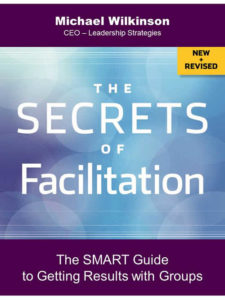 Fasten your seatbelts and get ready for a ride! In this session, the dynamic author of The Secrets of Facilitation will guide you through a preview of this comprehensive methodology for facilitating groups, task forces, strategy teams and other sessions that require groups to come together to achieve a common end.
Fasten your seatbelts and get ready for a ride! In this session, the dynamic author of The Secrets of Facilitation will guide you through a preview of this comprehensive methodology for facilitating groups, task forces, strategy teams and other sessions that require groups to come together to achieve a common end.
“I had no idea how much I didn’t know,” is the comment from one 10-year facilitation veteran after experiencing the workshop. Whether you are a long-time facilitator/trainer or new to facilitating teams and groups, you will walk away with tips you can use tomorrow.
Description
In this fast-paced, power-packed session, you will learn:
- The five Ps of preparation
- The four keys for grabbing people’s hearts and souls at the start
- Two important strategies for keeping the group focused and on track
- The surprising secret to phrasing questions so you get a bonfire of responses
- The four-step formula for resolving dysfunction
- The three reasons people disagree and strategies for resolving each
- The secret to using Level 3 energy to transform a group
Warning – the pace of this session is not for the faint of heart. If you are ready to see and learn practical facilitation techniques from a facilitation master, come join the ride!
Durations
- Keynote
- Half-day
- Full day
- Multi-day
Overview
 What is it that separates great facilitators from good ones? Sure, every facilitator needs to know about establishing ground rules, using the appropriate tools and maintaining a safe environment. But are there a set of skills that seem to distinguish the best facilitators from the rest of the pack?
What is it that separates great facilitators from good ones? Sure, every facilitator needs to know about establishing ground rules, using the appropriate tools and maintaining a safe environment. But are there a set of skills that seem to distinguish the best facilitators from the rest of the pack?
We say, “Yes!” As facilitator trainers and practitioners, we have had the opportunity to train over 27,000 people in facilitation skills through our flagship course The Effective Facilitator. While some facilitators were beginners, most were experienced, and many were very experienced. It is through working with this wide variation in proficiency that we have identified what we believe are the seven key skills that separate the great facilitators from the good ones.
In this workshop, the author of The Secrets of Facilitation will share the “Seven Separators” and will cover over a dozen techniques that you can begin using immediately to improve your facilitation.
Agenda
- Opening
- Workshop objectives
- Key facilitation skills
- The principles of facilitation – A methodology for facilitation
- The Seven Separators of Facilitation Excellence
- Establish and maintain a high energy level
- Ask starting questions that draw a vivid image
- Have a full toolkit of follow-up question types
- Respect the “power of the pen”
- Carry the group through the process
- Prevent, detect and resolve dysfunction
- Isolate and address sponsor’s key needs
Durations
- Half-day
- Full day
Overview
Imagine:
 The meeting has been going great. The participants are engaged, significant progress is being made, and the sponsor is well pleased. You are in facilitator's heaven! Suddenly, a major disagreement erupts. While some are vehement about one position, several people take an opposing stand; and still others believe the entire discussion is a waste of time. Voices get louder, people stop listening, others check-out. As the facilitator, you know you have to take control and help the group move to consensus. What do you do? What techniques do you use? What are the key underlying principles for reaching consensus?
The meeting has been going great. The participants are engaged, significant progress is being made, and the sponsor is well pleased. You are in facilitator's heaven! Suddenly, a major disagreement erupts. While some are vehement about one position, several people take an opposing stand; and still others believe the entire discussion is a waste of time. Voices get louder, people stop listening, others check-out. As the facilitator, you know you have to take control and help the group move to consensus. What do you do? What techniques do you use? What are the key underlying principles for reaching consensus?
This session will equip you with a clear understanding of the three reasons people disagree, three methods for establishing a consensus-focused process, and five techniques for getting to yes when disagreements occur.
Agenda
- Opening
- The Three Reasons People Disagree
- Level 1: Information
- Level 2: Values or Experience
- Level 3: Outside Factors
- Strategies for Addressing Disagreement
- Your Next Steps
Durations
- Keynote
- Half-day
Overview
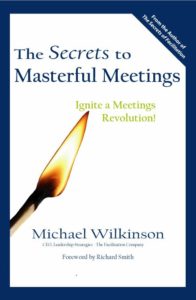 For many, meetings are viewed as a dreaded evil to be avoided at all costs; for little gets accomplished, much of the discussion is unfocused and unproductive; a lot of time is wasted. And yet, for some managers 50-75% of their workday is spent in meetings. This workshop is designed to significantly raise the bar on meeting quality by providing a complete framework and specific techniques for addressing the key barriers to successful meetings.
For many, meetings are viewed as a dreaded evil to be avoided at all costs; for little gets accomplished, much of the discussion is unfocused and unproductive; a lot of time is wasted. And yet, for some managers 50-75% of their workday is spent in meetings. This workshop is designed to significantly raise the bar on meeting quality by providing a complete framework and specific techniques for addressing the key barriers to successful meetings.
Description
This workshop provides specific strategies for eliminating unnecessary meetings, making the ones that are held more productive, and developing a roadmap for transforming meetings across your team, department, or enterprise.
The workshop will answer these ten questions and more.
- What is the three-question test for eliminating unnecessary meetings?
- What are the two most important things to know in preparing for a meeting? (Hint: it’s neither the agenda nor the participants!)
- What are the three key characteristics that EVERY person attending a working meeting should have?
- What are four strategies for getting a meeting started ON TIME?
- What are the three most important things to state at the beginning of a meeting BEFORE reviewing the agenda?
- What are four simple strategies for keeping the meeting focused and on track?
- What are the three reasons people disagree and how do you address each one?
- What are the best strategies for handling a drop-out, a nay-sayer, a whisperer, a dominator, and nine other common dysfunctions?
- What are the four most important things to do in closing a meeting?
- How can meeting rights be used to transform the way your organization meets?
Durations
- Keynote
- Half-day
- Full day
Overview
 As a facilitator, you know that your participants have the answers. They know the content and they know what will work in their environment. But while the participants have the answers, facilitators must bring the questions. Having the right questions and presenting them in the right way is essential to a facilitator helping a group produce effective results.
As a facilitator, you know that your participants have the answers. They know the content and they know what will work in their environment. But while the participants have the answers, facilitators must bring the questions. Having the right questions and presenting them in the right way is essential to a facilitator helping a group produce effective results.
In this session, you will learn and practice what the author of The Secrets of Facilitation describes as the most important questioning technique he has ever learned. Learn the secret of the starting question and you will never ask questions the same again!
Description
The starting question is the term we use for the question the facilitator asks to begin a discussion. The ability of the group to respond to a question is significantly impacted by the quality of the question asked by the facilitator. It is much like starting a fire. When facilitators use the wrong material to ask questions, they will get flickering flames that they have to blow on and feed continually to just keep the flames going. When facilitators use the right material, they quickly have a bonfire of responses with people hardly able to wait to make their contributions.
What is the secret of the starting question? How do you get the bonfire of responses? In the workshop participants will learn and practice the three-part formula for creating great starting questions.
By the end of the workshop, participants will have discovered the power of starting questions and will have improved their ability to create their own!
Durations
- Keynote
- Half-day
Overview
 Most facilitators are armed with the three or four techniques they routinely use to get a group talking. Some like brainstorming, others prefer small group break-out, still others mix it up alternating between open group discussion and structured round-robins. But are there other techniques? And what do you do if you are going to be with the same group for seven half-day sessions? Most of us would be out of engagement techniques by the third day and would have to start cycling back. In this session, you will have the opportunity to add to your toolbox with 25 strategies for maximizing engagement.
Most facilitators are armed with the three or four techniques they routinely use to get a group talking. Some like brainstorming, others prefer small group break-out, still others mix it up alternating between open group discussion and structured round-robins. But are there other techniques? And what do you do if you are going to be with the same group for seven half-day sessions? Most of us would be out of engagement techniques by the third day and would have to start cycling back. In this session, you will have the opportunity to add to your toolbox with 25 strategies for maximizing engagement.
Description
After completing the workshop, you will:
- Understand a structured process for introducing engagement activities
- Have a toolbox of additional engagement methods
- Have seen a variety of engagement methods in use
- Opening
- What Causes Effective Engagement?
- Engagement Strategies: Demonstration and Application
- Action Planning
Durations
- Half-day
- Full day
Overview
 How do you facilitate your team through a series of discussions to arrive at a strategic plan that the entire team understands and is committed to? How do you lead them through the creation of their mission statement? How do you guide them in selecting measurable targets? What steps can you take them through to develop robust values and guiding principles? How do you help them to ensure that their priorities are indeed the most important activities for them to take on?
How do you facilitate your team through a series of discussions to arrive at a strategic plan that the entire team understands and is committed to? How do you lead them through the creation of their mission statement? How do you guide them in selecting measurable targets? What steps can you take them through to develop robust values and guiding principles? How do you help them to ensure that their priorities are indeed the most important activities for them to take on?
This workshop takes you under the covers to get at the real “how-tos” for facilitating a team through strategy. You will learn specific methods and strategies for helping teams develop each of the nine components of a strategic plan including mission, vision, goals, objectives and strategies.
Agenda
- Key Issues in Facilitating Strategy
- Strategic Plan Overview
- Strategies for Developing Key Components
- Your Next Steps
Durations
- Full day
- Multi-day
Overview
 What is the key attribute that separates great training from good training?
What is the key attribute that separates great training from good training?
Is it that the content provides real world applicability? Is it that the training is interactive? Is it that the trainer is engaging? Or is it something else?
In this workshop, Michael Wilkinson, the author of The Secrets of Facilitation and the CEO of Leadership Strategies, will provide his firm’s answer and provide three tools you can begin using right away to help you develop “the best training in the world”
Description
As a result of this session, participants will be able to:
- Assess the quality of their current training against the “greatest training in the world” construct; and
- Implement specific strategies for raising the quality of their training programs.
Participants will learn and participate in experiencing three tools
- The what, the how, the why – a tool for designing training programs
- IEEI: Inform, Excite, Empower, Involve – a tool for starting a session by engaging people around the WII-FM
- Checkpoint: Review, Preview, Big View – a tool for refocusing the purpose at the beginning of each agenda item
Durations
- Keynote
- Half-day
- Full day
Overview
How do you transform a team of technical experts into trusted advisors? People with strong technical abilities all too often lack the softer people skills to be viewed as true partners and advisors to their clients. How many times have you seen technicians speak techno-babble leaving their audience even more confused? How many times have you seen clients get upset at a technician who didn’t manage their expectations or didn’t bother to ask questions about their business or seemed more interested in using the latest technology rather than understanding and addressing the client’s real need?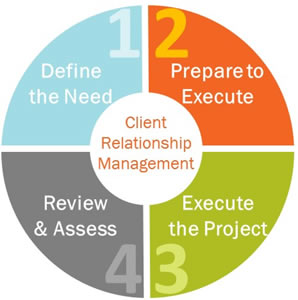 A trusted advisor knows the importance of relationship management and takes specific steps to build trust, understand the need, speak the client’s language, manage expectations, and deliver on what is promised.
In this session, Michael Wilkinson, the author of the Facilitative Leader and The Secrets of Facilitation, and a former technical expert himself, provides a host of key strategies for transforming technical experts into trusted advisors.
A trusted advisor knows the importance of relationship management and takes specific steps to build trust, understand the need, speak the client’s language, manage expectations, and deliver on what is promised.
In this session, Michael Wilkinson, the author of the Facilitative Leader and The Secrets of Facilitation, and a former technical expert himself, provides a host of key strategies for transforming technical experts into trusted advisors.
Agenda Topics
Key topics include:- The Trusted Advisor
- Relationship Management vs. Project Management
- The 5 Cs of Trust
- Defining the Need
- *Speaking Your Clients Language
- *Setting Expectations
- *Managing Scope
- *Recovering from Mistakes
- *Making Recommendations
Durations
- Keynote
- Half-day
- Full day
Overview
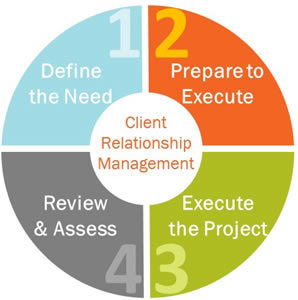 The skill that often separates the top professionals in a client-focused organization from the average ones is their ability to effectively manage - not just maintain - client relationships. Top professionals are adept at probing to identify the real need, setting and managing expectations, adapting to the communication style of clients, and gaining buy-in for solutions. Borrowing from key components of the firm’s three-day course, The Effective Consultant, this workshop provides critical skills for successfully managing client relationships.
The skill that often separates the top professionals in a client-focused organization from the average ones is their ability to effectively manage - not just maintain - client relationships. Top professionals are adept at probing to identify the real need, setting and managing expectations, adapting to the communication style of clients, and gaining buy-in for solutions. Borrowing from key components of the firm’s three-day course, The Effective Consultant, this workshop provides critical skills for successfully managing client relationships.
Description
As a result of this workshop, participants will:
- Have a process for managing client relationships
- Understand the 5Cs of Trust and how to build client trust
- Know the key questions to ask to define the client’s need
- Have strategies for probing, clarifying and managing expectations
- Understand the four fundamental communication styles and have experience in identifying and responding to each style
Durations
- Keynote
- Half-day
- Full day
- Multi-day
Overview
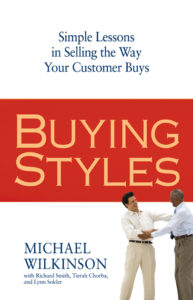 What were the buying styles of the last three customers who didn’t buy from you? What could you have done to better adjust to their buying style? If you said, “I don’t know” to either of these two questions, this workshop is for you.
Customers have a style of communication when they buy – a buying style – that successful salespeople match to gain their customers attention and close the sale. If your work involves you selling to others in any way, or if you coach people in enhancing their sales effectiveness, this workshop will show you how to use buying styles to maximize your bottom line.
What were the buying styles of the last three customers who didn’t buy from you? What could you have done to better adjust to their buying style? If you said, “I don’t know” to either of these two questions, this workshop is for you.
Customers have a style of communication when they buy – a buying style – that successful salespeople match to gain their customers attention and close the sale. If your work involves you selling to others in any way, or if you coach people in enhancing their sales effectiveness, this workshop will show you how to use buying styles to maximize your bottom line.
Description
Salespeople lose revenue every day because they sell using a style that is different from their customer's buying style-then wonder why they lost the sale! This workshop offers tools that participants can put to use right away, enabling them to recognize why their selling approach causes certain people to move to action, while the same approach turns others away! Unlock powerful catalysts designed to create effective customer and teambuilding skills that help participants understand themselves and others.- Getting Started
- Understanding Buying Styles
- Tailoring Your Selling Style
- Action Planning
- Putting Buying Styles to Work
Durations
- Keynote
- Half-day
- Full day
Overview
Imagine:
 The meeting has been going great. The participants are engaged, significant progress is being made, and the sponsor is well pleased. You are in consultant's heaven! Suddenly, a major disagreement erupts. While some are vehement about one position, several people take an opposing stand; and still others believe the entire discussion is a waste of time. Voices get louder, people stop listening, others check-out. As the consultant, you know you have to take control and help the group move to consensus. What do you do? What techniques do you use? What are the key underlying principles for reaching consensus?
The meeting has been going great. The participants are engaged, significant progress is being made, and the sponsor is well pleased. You are in consultant's heaven! Suddenly, a major disagreement erupts. While some are vehement about one position, several people take an opposing stand; and still others believe the entire discussion is a waste of time. Voices get louder, people stop listening, others check-out. As the consultant, you know you have to take control and help the group move to consensus. What do you do? What techniques do you use? What are the key underlying principles for reaching consensus?
This session will equip you with a clear understanding of the three reasons people disagree, three methods for establishing a consensus-focused process, and five techniques for getting to yes when disagreements occur.
Agenda
- Opening
- The Three Reasons People Disagree
- Level 1: Information
- Level 2: Values or Experience
- Level 3: Outside Factors
- Strategies for Addressing Disagreement
- Your Next Steps
Durations
- Keynote
- Half-day
Overview
Imagine:
 The meeting has been going great. The participants are engaged, significant progress is being made, and the sponsor is well pleased. You are in facilitator's heaven! Suddenly, a major disagreement erupts. While some are vehement about one position, several people take an opposing stand; and still others believe the entire discussion is a waste of time. Voices get louder, people stop listening, others check-out. As the facilitator, you know you have to take control and help the group move to consensus. What do you do? What techniques do you use? What are the key underlying principles for reaching consensus?
The meeting has been going great. The participants are engaged, significant progress is being made, and the sponsor is well pleased. You are in facilitator's heaven! Suddenly, a major disagreement erupts. While some are vehement about one position, several people take an opposing stand; and still others believe the entire discussion is a waste of time. Voices get louder, people stop listening, others check-out. As the facilitator, you know you have to take control and help the group move to consensus. What do you do? What techniques do you use? What are the key underlying principles for reaching consensus?
This session will equip you with a clear understanding of the three reasons people disagree, three methods for establishing a consensus-focused process, and five techniques for getting to yes when disagreements occur.
Agenda
- Opening
- The Three Reasons People Disagree
- Level 1: Information
- Level 2: Values or Experience
- Level 3: Outside Factors
- Strategies for Addressing Disagreement
- Your Next Steps
Durations
- Keynote
- Half-day

